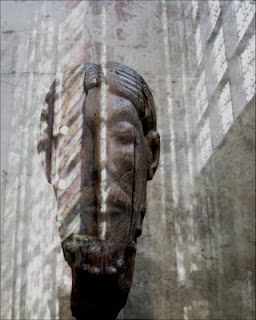Serendipity at work again – with my freshly honed interest in cultural history (1), I unfailingly stumbled (during a cursory visit to a second hand shop ) upon a great classic in the genre: Huizinga’s “The Autumn of the Middle Ages”.
For me this is obviously the perfect autumnal book to spend a lovely Easter-afternoon with under an insouciantly blossoming tree. While birds were chirping, children laughing and a sweet breeze ruffled the book’s pages , I avidly plunged into this sublimely sombre spectacle of late-medieval pessimism and decadence.
The book is full of pleasing discoveries, such as the fact that in late-medieval texts “melancholize” is actually a verb, denoting thorough thinking (“quand il eut merancoliet une espasse, il s’avisa que il rescripoit [...]” – “when he had melancholized for a while, he decided he would write back [...] “).
In any case, my dear blog readers can rest assured : despite my apparent surrender to frivolous Easter weekend hedonism (such as outings filled with ice cream eating and rosé-sipping on sunny terraces, and lying about in lush green grass) I did not abandon the true contemplative Easter-spirit (2).
Not only did I find this suitably reflective book, but also did I manage to slip from a terrace right into a church where I could meditate upon a 15th C Last Supper and where I could be filled with compassion looking at a wooden, timeworn, so very weary (or resigned?) head of Christ.
And while sitting on a church-bench with C. (who was heroically suppressing her deep aversion from all things religious, just muttering vaguely about obscurantism), I could even catch fragments of that heart-rending Matthäus-passion aria – “erbarme dich, Mein Gott, Um meiner Zähren willen” (3)
Easter-notes
(1) see previous post
(2) disclaimer: in this blog contemplative & spiritual raptures are always strictly humanist-aesthetical
(3) of course, of course I’m against the mechanical reproduction of religious classical music through loudspeakers in churches. Of course this reduces transcendental music to mere muzak, as if it were X-mas songs aired in a shopping street. Of course it should be the real thing! But still, caught unawares by that aria is .... well, heart rending

2 comments:
this head of Christ is truly awe-inspiring... i saw some Middle Ages wooden sculptures in Vienna last summer and was blown-away by their grace and ability to express such intense emotions...
ps1. i wrote down the word “melancholize”, it is a true gem! - and is it a coincidence that it means 'thorough thinking', i wonder - can one ponder thoroughly when one is happy? :-)
ps2. (i like to echo your notes with ps. :-)
when you posted this and i first read it, i was working on a little video piece called... well, Serendipity :-)
dearest R - indeed, just as one can't be happy when pondering too thoroughly, one definitely can't be thoroughly pondering when one is happy!
and obviously, i love it when my notes are echoed by the graceful afterthoughts that your ps's are --especially when they evoke such a frivolous coincidence!
Post a Comment